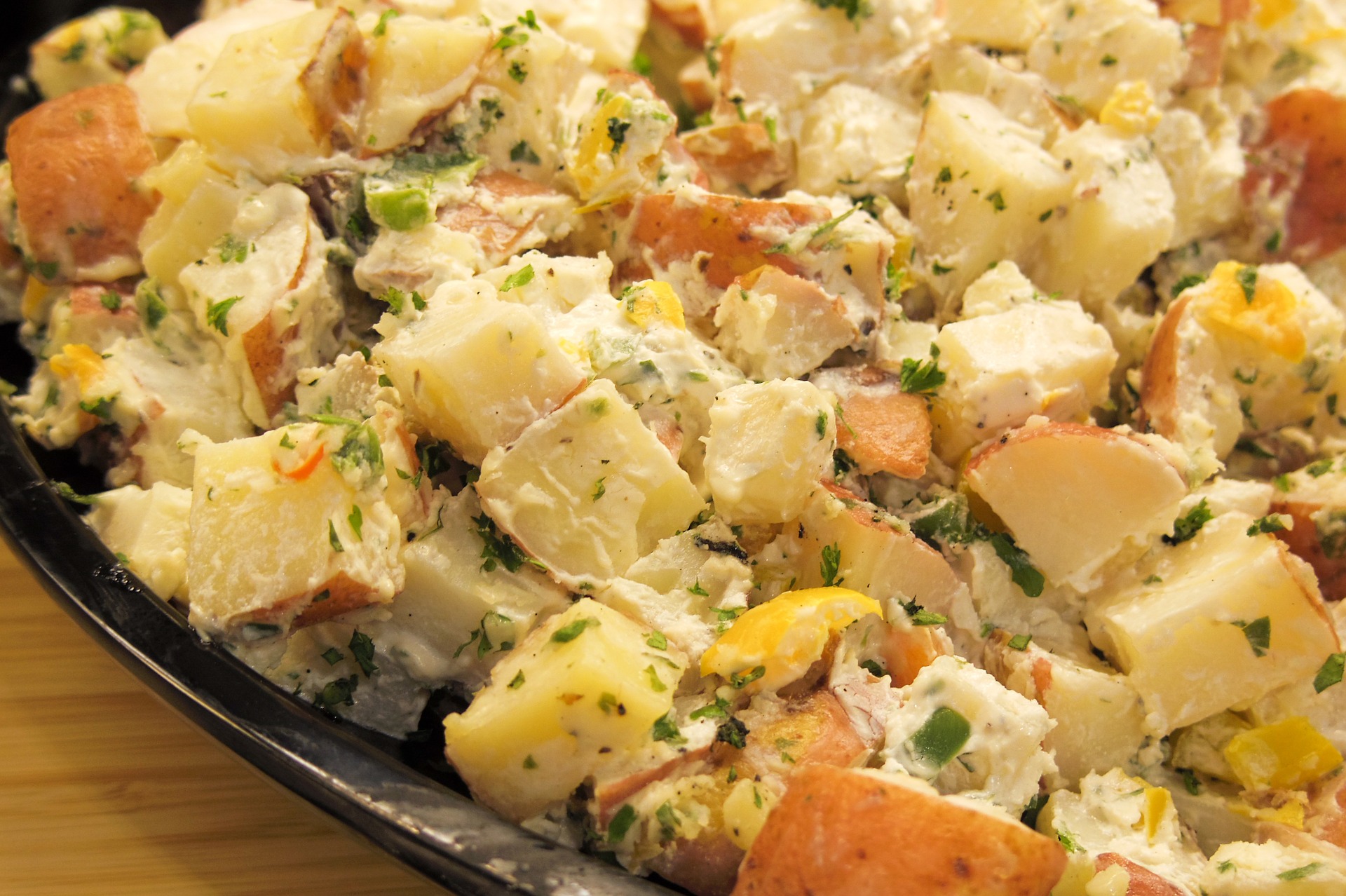Potato Salad, A Nice Addition to Fourth of July Celebration
TEXARKANA, Ark. –
While hamburgers, hot dogs, wings, brisket or sausages may grace your 4th of July party table, the side dish may be what your guests are really waiting for. A savory side may determine if your party is a win or a flop.
When it comes to side dishes on 4th of July, Potato Salad is likely to be a top choice. Potato Salad has been a part of American meals since the mid nineteenth century. It has been a popular side dish choice for most cookouts and picnics.
Almost everyone who loves potato salad has a favorite recipe they make. There are about as many potato salad recipes as there are people who make it.
Potato salads generally contain a combination of cooked potatoes, chopped onion and other vegetables; sometimes boiled eggs, and usually some type of salad dressing or mayonnaise.
Since many of the ingredients in this popular side dish spoil easily, food safety is important. Keep in mind proper handling of the ingredients. Always keep potato salad refrigerated, either in a refrigerator, if that is a possibility, or on a bed of ice, or freezer packs, in an ice chest.
If away from refrigeration, put your ice chest in the shade, and keep the lid closed as much as possible. In other words, don’t keep potato salad in the same ice chest as you would soft drinks or water where the lid will be opened continually.
For food safety, keep your potato salad at a temperature of between 32 and 40 degrees Fahrenheit. It should not be left out of refrigeration for more than 2 hours if inside; or 1 hour when temperatures are hot. Leaving potato salad out for more than the 2-hour maximum allows harmful bacteria that can cause food poisoning to grow quickly at warm temperatures.
Next to assuring that your salad will be safe to eat, choosing the right potato is the next essential step. You might love russet potatoes for baking and making French fries at home, but they don’t make good potato salad.
Start by using a thin-skinned boiling variety. This type of potato can be steamed, pressure-cooked, boiled, baked or grilled and will not fall apart when sliced, grated or cubed. They maintain their shape well. Look for waxy varieties such as the red potato, yellow finn or Yukon gold. They should be of uniform size and well-shaped.
Next boil the potato to the right stage. When a potato can be easily cut into with a fork, then it is ready to be removed from the water.
While the potatoes are hot is the best time to add the seasonings. Potatoes absorb flavors best while hot.
Wait to add any ingredients such as salad dressing, mayonnaise or boiled eggs, which can be damaged by the heat. Let the potatoes cool before completing your salad.
Once the potatoes have cooled and you have completed your salad, refrigerate before serving. This will allow the flavors to blend together.
If you are feeling adventurous, try something a little different with your potato salad. Try adding different vegetables such as cucumber, celery, onion, bell peppers, and even English peas for variety. Fresh herbs and mustards are also a special added treat.
If you are planning to have potato salad this 4th of July, try this Country Potato Salad. I prefer to cut my potatoes into smaller pieces, rather than leaving them whole for boiling. This reduces the amount of cooking time needed.
Country Potato Salad
6 cups cooked, diced potatoes
1 cup sweet pickle relish
2 tablespoons green pepper, chopped
1 medium onion, chopped
2 tablespoons pimiento, chopped
6 hard boiled eggs, chopped
1 cup mayonnaise or salad dressing
2 tablespoons prepared mustard
Optional for garnishing:
2 hard boiled eggs, sliced
paprika
fresh parsley sprigs
Peel and dice potatoes; add to stockpot for boiling. Boil until potatoes are fork tender. Drain liquid from stockpot. Add all ingredients except eggs and mayonnaise or salad dressing. Gently mix well. Once cool, add eggs and mayonnaise or salad dressing and gently mix. Garnish by placing egg slices around perimeter of container; dust lightly with paprika and add parsley sprigs (if desired). Refrigerate until ready to serve.
For more information, contact the Miller County Extension Office, 870-779-3609 or visit us in room 215 at the Miller County Courthouse. We're online at cdue@uada.edu, on Facebook at UAEXMillerCountyFCS, on Twitter @MillerCountyFCS or on the web at uaex.uada.edu/Miller.
By Carla Due
County Extension Agent - FCS
The Cooperative Extension Service
U of A System Division of Agriculture
Media Contact: Carla Due
County Extension Agent - FCS
U of A Division of Agriculture
Cooperative Extension Service
400 Laurel Street, Suite 215 Texarkana AR 71854
(870) 779-3609
cdue@uada.edu
The Arkansas Cooperative Extension Service is an equal opportunity institution. If
you require a reasonable accommodation to participate or need materials in another
format, please contact your County Extension office (or other appropriate office)
as soon as possible. Dial 711 for Arkansas Relay.
Pursuant to 7 CFR § 15.3, the University of Arkansas System Division of Agriculture
offers all its Extension and Research programs and services (including employment)
without regard to race, color, sex, national origin, religion, age, disability, marital
or veteran status, genetic information, sexual preference, pregnancy or any other
legally protected status, and is an equal opportunity institution.
